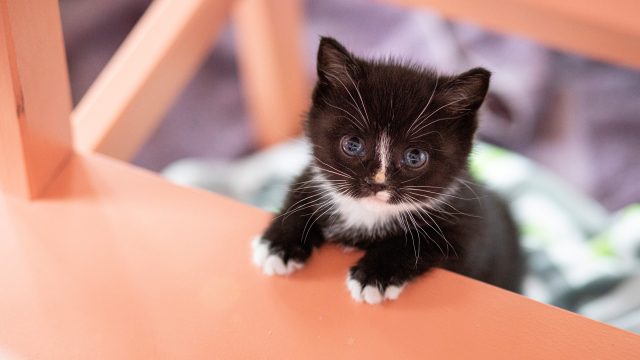
Quinnipiac University: “People and Animals in Crisis:” Public Forum on Protecting Animals in Domestic Violence Situations
The Animal Legal Defense Fund Student Chapter at Quinnipiac University School of Law in Hamden, Connecticut, known on campus as the Animal Law Society (ALS), recently gained some community recognition through efforts on behalf of Connecticut S.B. 284, a bill pending in the Connecticut state legislature that would allow judges to issue orders of protections for animals in domestic violence situations.
Advocates in Connecticut, including the Quinnipiac ALS, are working toward passage of this bill, which is modeled on Maine’s law extending the coverage of restraining and protective orders in domestic violence cases to include pets of the victims.
Although culminating in a public forum at the law school, their efforts began when ALS president Kerry Patton contacted one of the bill’s sponsors, State Representative Diana Urban, offering his group’s assistance.
On March 5th, Kerry was among the people testifying on behalf of S.B. 284 in a hearing before the legislature’s Judiciary Committee. In his remarks, Kerry tried to counter the reticence of some who fear that by focusing on animals this bill will detract from efforts to aid the human victims of domestic violence.
An Associated Press article on the hearing included his quote, “This is a human rights bill. Domestic violence is primarily about control of the victim, and anger when that control starts to slip away.” (Associated Press, March 6, 2007)
Following the hearing, Kerry was invited to discuss the issue on the air by three state radio stations. On all three programs, he found a receptive audience to the message that while animals are cruelly used as pawns in domestic violence cases, the efforts of proponents of S.B. 284 were meant to give aid to the people who are faced with these dire straits. Kerry stated, “Violence is the tool; intimidation is the intent; control is the goal.”
These media opportunities also gave Kerry a chance to talk about animal law in general, his student group in particular, and their efforts to establish at Quinnipiac a program allowing students to combine their passion for animal advocacy with their chosen career. The hosts of all three programs enthusiastically plugged the group’s upcoming public forum, “People and Animals in Crisis” – or “PANIC” as it was dubbed by ALS members.
“Panic” was organized largely by chapter secretary/treasurer Amber Sarno, and held on March 20th. As Kerry mentioned in his opening remarks, “We call it ‘people and animals in crisis’ because we understand the panic in an animal owner’s heart when they cannot protect their pets. Tonight is about animal welfare by extension, of course… but the main focus of this evening will be on asking what society can to do help those members of our community who find themselves in panic over the welfare of their pets.”
Discussion included the private, largely unseen panic faced by a domestic violence victim whose desperate situation is compounded by concern for the safety of her (or his) pets. Diana Urban discussed S.B. 284 in depth, as well as other legislative initiatives designed to reduce barriers to efforts by advocates to relieve animal suffering.
The program also included a presentation by Dr. Arnold Goldman, executive director of the Connecticut State Animal Response Team. Dr. Goldman described the mission of CTSART, best illustrated by pointing to the post-Katrina agony faced by pet owners in the Gulf Coast region who so often had to decide between saving themselves and staying behind to try to save their pets. He also talked about the challenges of obtaining funding to purchase and stockpile supplies in hopes they are never used, and of the need to establish a town by town presence for optimum effectiveness.
Still, less than two years after its inception, Connecticut’s SART includes more than 100 committed volunteers trained to spring into action should disaster strike their state, to ensure animal owners do not have to face the excruciating choices we all witnessed following Katrina.
The evening concluded with remarks by representatives of Connecticut’s largest no-kill animal shelter, operated by the Meriden Humane Society. Their shelter has received extensive media attention this past winter, as they face the possibility of having to close their doors because of the burden of their considerable veterinary bills. Attendees of the forum were asked to open their wallets and make a donation to back what are truly front-line efforts on behalf of abandoned animals.
Quinnipiac’s Animal Law Society has begun to make a name for itself in their state, and its members have earned respect for their efforts.
However, according to Kerry, they have no illusions; S.B. 284 h as not yet been passed, CTSART is still battling for funding and community acceptance, and animal shelters statewide are struggling. In the meantime, members are keeping in mind one of Rep. Urban’s key points: change happens, but incrementally. Kerry wants animal law advocates to remain hopeful: “Some animal welfare advocates want to cross the ocean in one leap; we need to remember that while progress can seem so elusive that we feel we are merely treading water, in truth each stroke brings us a little bit closer to our goals.”
Focus Area
How We Work
Recent News
-
Pro Bono Vibes: Let’s Make a Difference for Animals Together
Join team members of the Animal Legal Defense Fund’s Pro Bono Program for an informative discussion about the meaningful and various ways that law professionals can make a positive difference in the lives of animals. -
Student Convention – 2025
The Student Convention provides an opportunity for law students to receive career advice from leaders in the animal law field and network with law students from schools across the country and beyond. -
Rhode Island Governor Signs Cat Declaw Ban into Law
Declawing is an invasive surgical procedure to remove the last bone in a cat's toesJuly 2, 2025 News



